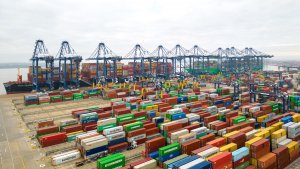
As the effects of Brexit start to reach consumers, we’ve been looking at what we can do to help deliveries to Spread Group customers. It affects all of us shipping into and out of the UK.
After years of successful ecommerce, customers expect online orders to be fulfilled reliably, conveniently, quickly and cheaply.
Despite the complications, the UK is still a desirable market because it’s large, mature, and has led the way in ecommerce take up. For retailers like us, the UK is an important customer base.
We try to make the shopping experience native to UK, with a .co.uk domain name and payment in pounds. This is particularly important for our Spreadshop shop owners, who run a free online shop and can appear geographically neutral to their consumers.
However, if you’re putting forward a local image, it’s especially important that shipments do not get stopped in customs before reaching their final destination.
New delivery challenges for those shipping into the UK include unexpected costs and delays. One way to avoid these is through prepayment of taxes and duty.
According to a recent Which? survey of more than 2,000 members of the public, two in five (42%) people who ordered products online in early 2021 experienced some issues.
Delays were the most common (24%), but one in 10 were asked to pay additional handling or delivery fees. VAT is also an issue. UK shoppers are charged VAT at 20%, which can be levied on delivery for higher priced items.
We managed to reduce package delays in Switzerland by prepaying taxes and duties. As a result the complaint rate went down, the number of service contacts due to customs duties dropped by 80% and we have 90% fewer additional payments too.
We then saw the number of orders increase by around half. Switzerland has bilateral treaties and is within the single market, but is not an EU member state. In the past this has meant some friction at the border for ecommerce companies.
Prepayments reduced the amount of our deliveries that got stuck in customs. We started to communicate the full and final price at check out, so there is nothing more to pay once the customer has ordered.
We have experienced changes to ecommerce duty laws or stricter enforcement in various countries like Australia where we also show prices inclusive of local taxes and customs duties. So there are no surprises!
Shipping and returns are other ways to reassure UK customers about deliveries from EU countries. We have found that being realistic about delivery times is useful.
We try to manage delivery expectations from the outset and also offer a reassuring return and refund system. Spread Group accepts back all consumer create your own orders. This means consumers are not out of pocket or facing a long wait for a refund.
Ultimately successful delivery remains the great challenge of ecommerce. Without it the sale is lost and the company reputation is damaged. To avoid this, we manage the consumers' expectation for delivery times and reduce exposure to unexpected costs.
We have developed software to deal with a multitude of local taxes and duties. It’s also better to promise a longer delivery time and surprise the customer by a day, than have a frustrated or worried customer.
Brexit has created some extra challenges for European ecommerce, but creative thinking can overcome them. We are focussing on the customer experience not only on the site, but all the way through to delivery to their door.
Hugo Smoter is Chief Commercial Officer at Spread Group.
Thanks for signing up to Minutehack alerts.
Brilliant editorials heading your way soon.
Okay, Thanks!

